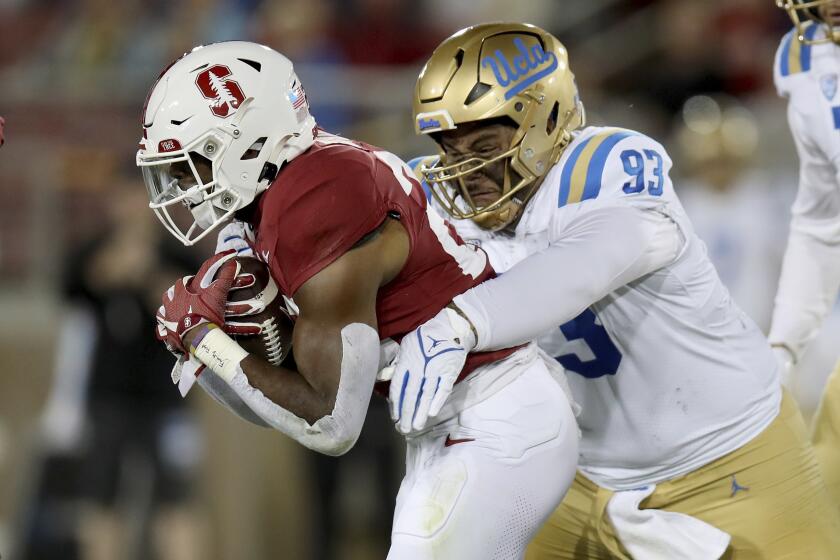This One Won’t Even Be Close
The Pittsburgh Steelers are so much better than the Seattle Seahawks this year that the only reason to play today’s game is to avoid disappointing the throngs of party-goers who have turned the Super Bowl into an unofficial national holiday.
At the moment, the one-sided nature of this game isn’t commonly realized because Pittsburgh was seeded sixth among AFC teams this season whereas Seattle was clearly No. 1 in the NFC.
Yet those rankings are misleading, as rankings often are.
Here’s another way to look at Super Bowl XL:
Why the AFC Throws
Pittsburgh is carrying the banner of the obviously superior conference, which is better because it has more good passing teams, seven or eight, to the NFC’s one or two. To succeed in the AFC, you have to throw effectively, and that’s the right way to prepare for the playoffs.
Conventional wisdom makes a wholly different point. Many coaches and commentators argue that playoff wins depend on running and stopping the run. But the more accurate and more recently verified definition is to pass and stop the pass.
Twelve of the last 13 Super Bowl champions have been superb passing teams. The one exception, Baltimore, won in 2001 when the NFL’s best quarterbacks were incapacitated before rules against late hits were strengthened. Otherwise, passers have dominated the Super Bowl from the days of Troy Aikman and Steve Young to Brett Favre and John Elway and on to Tom Brady.
This season, the Steelers out-passed good passing teams in their first three playoff games, beating three division champions — Cincinnati, Indianapolis and Denver.
Of nearly equal importance, the Steelers won all three passing duels on the road, where they are today, facing the NFC’s best passing team.
That 12th Man
The Seahawks in their playoff games beat Washington and Carolina, two survivors in the middling NFC.And they won those games on their home field, where Seattle fans give them so much vocal support that they’re called the 12th man.
The Seahawks were 10-0 at home this season but only 5-3 on the road.
In other words, after winning two easy games with the help of their 12th man, the Seahawks will be on their own when they engage the champion of the tougher conference in a tougher setting.
Big Ben’s Edge
The decisive point may be that one of the game’s great passers, Pittsburgh’s Ben Roethlisberger, will be attacking a Seattle team that has the NFL’s 25th-best pass defense — a depressing statistic for the Seahawks, who spent the year playing unimpressive NFC teams and passers.Roethlisberger, in only his second NFL season, is already a dominating force. In his last start, he threw nine times on third down in Denver and converted a defense-demoralizing eight.
Significantly, Roethlisberger gets a lot of help from his blocking line; from his ballcarriers, swift Willie Parker and tough Jerome Bettis; from his two intermediate-route specialists, Hines Ward and tight end Heath Miller, whose skills compensate for Pittsburgh’s lack of deep-receiver speed; and from his coordinator, Ken Whisenhunt, who oversees an offensive system with a particularly fluid play design and the league’s best trick plays.
Roethlisberger, for all that, is himself the Steelers’ edge. He opens up their running game just running onto the field. In addition:
As a pocket passer, he is an accomplished reader of defenses who can usually find and throw to the open receiver. That puts him among a minority of NFL quarterbacks.
He is even more dangerous when he bails out of the pocket, where he wins two ways — passing and running.
During the playoffs, the Steelers have scored touchdowns on 10 of 13 trips inside the 20-yard line.
Race for the Lead
The Seahawks have also passed successfully in recent games with underrated Matt Hasselbeck, the NFC’s leading quarterback. And in this game for a while, Hasselbeck may be all they have.Early on, neither team should expect to run with success — even though Seattle has Shaun Alexander, who led the NFL in rushing this season. The problem: In a 32-team league, the Steelers were third in rushing defense and the Seahawks fifth.
Both coaches, moreover, are determined not to fall behind. Pittsburgh’s Bill Cowher made that precise point before the last two games. And Seattle’s Mike Holmgren is plainly aware that he can’t fall behind Cowher.
When Cowher’s Steeler teams have had a 10-point lead, they have won more than 70 times and lost only twice.
All this is likely to result in assertive passing by both sides. What’s in doubt is whether Holmgren’s team can keep up.
In their last two games — against the Colts with Peyton Manning and then the Broncos — the Steelers led at halftime by a combined score of 38-6.
Their high-tech offense figures to overwhelm Seattle’s West Coast offense, which, based on short passes and runs, limits Hasselbeck’s downfield passes.
Indeed, Seattle’s only chance is that Cowher will get complacent viewing Seahawk tapes and come out confident that he can run.
That would be a miscalculation. Even AFC champions — whose advantage over NFC teams is based on throwing better passes — can be upset if they suddenly start running the ball.
Memo to those watching: Don’t bank on an upset.
*
(BEGIN TEXT OF INFOBOX)
Wild stuff
The Pittsburgh Steelers are the ninth wild card and first sixth-seeded team to reach the Super Bowl. The eight others:
| SEASON/TEAM | RESULT |
1969: Kansas City Chiefs | Def. Minnesota in Super Bowl IV, 23-7 |
1975: Dallas Cowboys | Lost to Pittsburgh in Super Bowl X, 21-17 |
| 1980: Oakland Raiders | Def. Philadelphia in Super Bowl XV, 27-10 |
| 1985: New England Patriots | Lost to Chicago in Super Bowl XX, 46-10 |
1992: Buffalo Bills | Lost to Dallas in Super Bowl XXVII, 52-17 |
| 1997: Denver Broncos | Def. Green Bay in Super Bowl XXXII, 31-24 |
1999: Tenn. Titans | Lost to St. Louis in Super Bowl XXXIV, 23-16 |
| 2000: Baltimore Ravens | Def. New York Giants in Super Bowl XXXV, 34-7 |
More to Read
Get our high school sports newsletter
Prep Rally is devoted to the SoCal high school sports experience, bringing you scores, stories and a behind-the-scenes look at what makes prep sports so popular.
You may occasionally receive promotional content from the Los Angeles Times.






